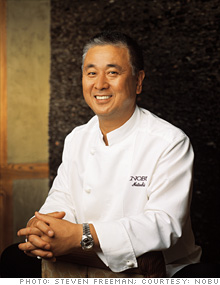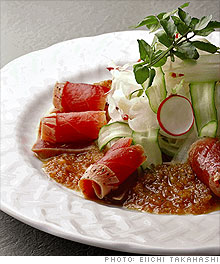How Chef Nobu built his sushi empire
Celebrity chef Nobu Matsuhisa survived fire and bankruptcy on the route to culinary independence.
 |
| Sushi master Nobu Matsuhisa |
 |
| Nobu's sashimi salad with Matsuhisa Dressing |
(Fortune Small Business) -- As a young boy growing up in Japan, Nobu Matsuhisa dreamed of becoming a sushi chef in a restaurant where he could create his own menu. It took more than 30 years of experimentation, failure and incompatible business partners to reach his goal, as he worked his way from dishwasher in Tokyo to co-owner of a small sushi establishment in Lima, Peru.
And on one snowy night in Anchorage, Matsuhisa literally watched his dream go up in flames.
Today, Matsuhisa and his business partners, who include actor Robert De Niro, operate 22 restaurants around the world. The newest launched in Dubai late last year. Mexico City, Moscow and Cape Town are slated for restaurant openings this spring.
Matsuhisa, who continually travels the world to check in on his restaurants, recently sat down with Fortune Small Business to share his story.
When did you first know you wanted to be a sushi chef?
When I was 11 or 12 - a young boy in Japan - one of my older brothers took me to a sushi restaurant. I had never been to one, and it was very memorable. Back then sushi was expensive and hard to come by, not like today, when there's a sushi restaurant on every street corner and you can buy it in supermarkets.
I recall walking through the sliding glass doors into this tiny restaurant and immediately feeling the energy of the place as the sushi chef yelled out, "Irasshai! Welcome!" It was a very open, brightly lit place that smelled like vinegar and soy, and I remember the chef calling the names of fish and food - "toro! gyoku!" - for each order. You know how kids dream of being soccer players or actors? Well, my dream was to be a sushi chef.
After graduating high school in Saitama, Japan I moved to Tokyo and took a full-time job at a sushi restaurant called Matsuei, where I worked for nearly seven years. I didn't start cooking right away: For three years I washed and cleared dishes and cleaned the entire restaurant. I also went to the fish market every morning with my mentor, the master of the restaurant. I carried the basket, and he bought the fish. Back at the restaurant I would clean the fish. For three years every day was like this until one of the sushi chefs left and the master promoted me to fill his spot.
The days were long. There were times I wondered when I would be able to move behind the counter and start making sushi. But whenever I got fed up, I would remember why I chose the job in the first place: I wanted to prepare sushi for customers and make them happy. Also, doing all those jobs - dishwasher, busboy and so forth - made me tough, and today I am able to empathize with my workers.
Your early career included many hops to overseas places. When did you first decide to leave Japan, and why?
At Matsuei I met a Peruvian of Japanese descent who used to stop in for sushi about twice a year. One day - I was about 24 - he asked me quite seriously if I would consider moving with him to Peru to open a sushi restaurant. It was a dream come true, and I agreed at once. My father was a lumber merchant who died when I was seven. Whenever I felt sad, I used to stare at a photograph of him taken on the Pacific island of Palau, where he had once traveled to buy lumber. I wanted to be like my father. Staring at the photo I knew that I too would go overseas some day.
Lima was the perfect town for a sushi chef. With the Pacific Ocean nearby, fresh fish was never in short supply. And at the time - about 35 years ago - there were only three or four other Japanese restaurants in town. Yet Mitsubishi and many other big Japanese corporations had invested in Peru, so there were plenty of Japanese businessmen looking for good sushi.
I was a 49% stakeholder in the restaurant, but I had to do everything. Just as I had done during my apprentice days in Japan, I opened and cleaned the restaurant, put together the menus and made basic sauces. Back then you couldn't jog down to the corner store to buy fish paste or other specialized Japanese ingredients, so I created everything from scratch, through trial and error. A lot of what I experimented with in Peru became part of my repertoire later on.
Have you ever been to Mexico City and haggled with the locals over souvenirs? Well, in Peru you had to negotiate like that to get the freshest fish at the market. But the fishermen didn't sell everything they caught. Peruvians didn't seem to like eel, for example, which was a very common sushi topping. So one day I saw a beautiful piece of eel just sitting there, unpriced, and I asked the fisherman for it. He asked me what I wanted it for.
"Well," I said, "it's for my dog that I brought here from Japan. He's accustomed to eating eel every day, and now, because he hasn't had any, he's very homesick." The fisherman laughed and ended up giving me the 20 or 30 kilos of eel for just a few dollars. The next day at the restaurant, I made the eel into tempura and sushi, which sold really well.
I bought eel this way for a couple of weeks. Then one day the fisherman winked and asked me, "How's your dog?" It turned out that a chef from another restaurant had shown up looking for eel. The fisherman asked that chef if he had also brought his dog over from Japan. I wasn't surprised to see that the eel had been marked up to an astonishing price.
It sounds as though you enjoyed Peru. Why did you leave?
The restaurant did very well. We attracted loyalists from the Japanese embassy and lots of major trading firms. My wife and I had a daughter. (I had married before we left for Peru.) We lived in a palatial house with maids. Things were great, except that my business partner and I couldn't agree on how to run the restaurant.
I wanted to make people happy with my food. This meant buying high-quality ingredients and using only the freshest fish. But my partner was more concerned with profit - he told me to rein in food costs by buying cheaper fish. This was an ongoing fight for about three years, after which I decided to leave the restaurant entirely. Chefs are artists, and I couldn't be happy with my art if I was forced to use cheap ingredients.
You then moved to Argentina...
I floundered a bit for the next four years. I moved to Buenos Aires, where a friend found me a job as a sushi chef in a local restaurant. Having been a partner in my last restaurant, it was tough to work as an employee - especially in a country where the staple protein is meat, not fish. You could lead a wonderful life in Argentina because the cost of living was low. But so were wages, and the money that I had saved up began to disappear. I moved back to Japan after a year, when my wife became pregnant with our second child. I helped my brother at his factory and worked once again as a sushi chef in someone else's restaurant. But I knew I wanted another shot at working overseas.
I started asking acquaintances if anyone was looking for a good sushi chef. A Japanese actor who frequented the place where I was working recommended Alaska. He had friends in Anchorage, which was starting to boom because of the oil pipeline and because so many airlines had minihubs there; Alaska was the pit stop for planes flying from Asia to the Lower 48. He suggested we open up a sushi restaurant together in Anchorage, and I agreed. At that time I didn't really care where I was going. I just wanted to get out of Japan.
For months we worked without taking any time off. I helped with the construction, secured supply channels for ingredients and created a menu. I plunged into debt to launch the restaurant. But when we opened our doors a few months later (in October), it was busy from the start, very well received. My staff and I worked for 50 straight days.
That Thanksgiving I decided to close the restaurant and give all of us a little break. I went to a friend's house to eat turkey (and sushi!) and was having a great time when the phone rang. It was my business partner. "Nobu, the restaurant's on fire!" he yelled. I thought it was a bad joke, but he said it again. That's when I heard the sirens.
-
The Cheesecake Factory created smaller portions to survive the downturn. Play
-
A breeder of award-winning marijuana seeds is following the money and heading to the U.S. More
-
Most small businesses die within five years, but Amish businesses have a survival rate north of 90%. More
-
The 10 most popular franchise brands over the past decade -- and their failure rates. More
-
These firms are the last left in America making iconic products now in their twilight. More








